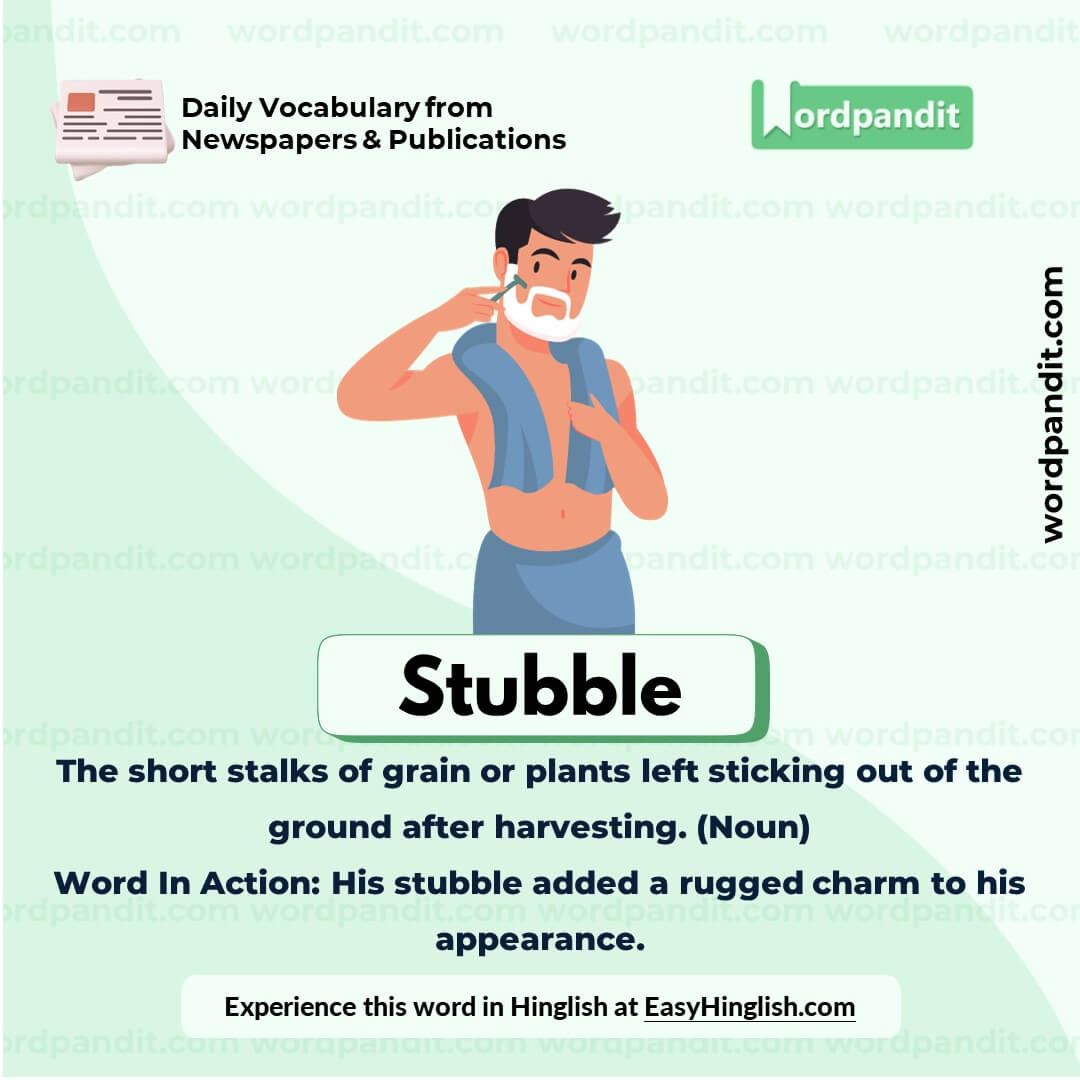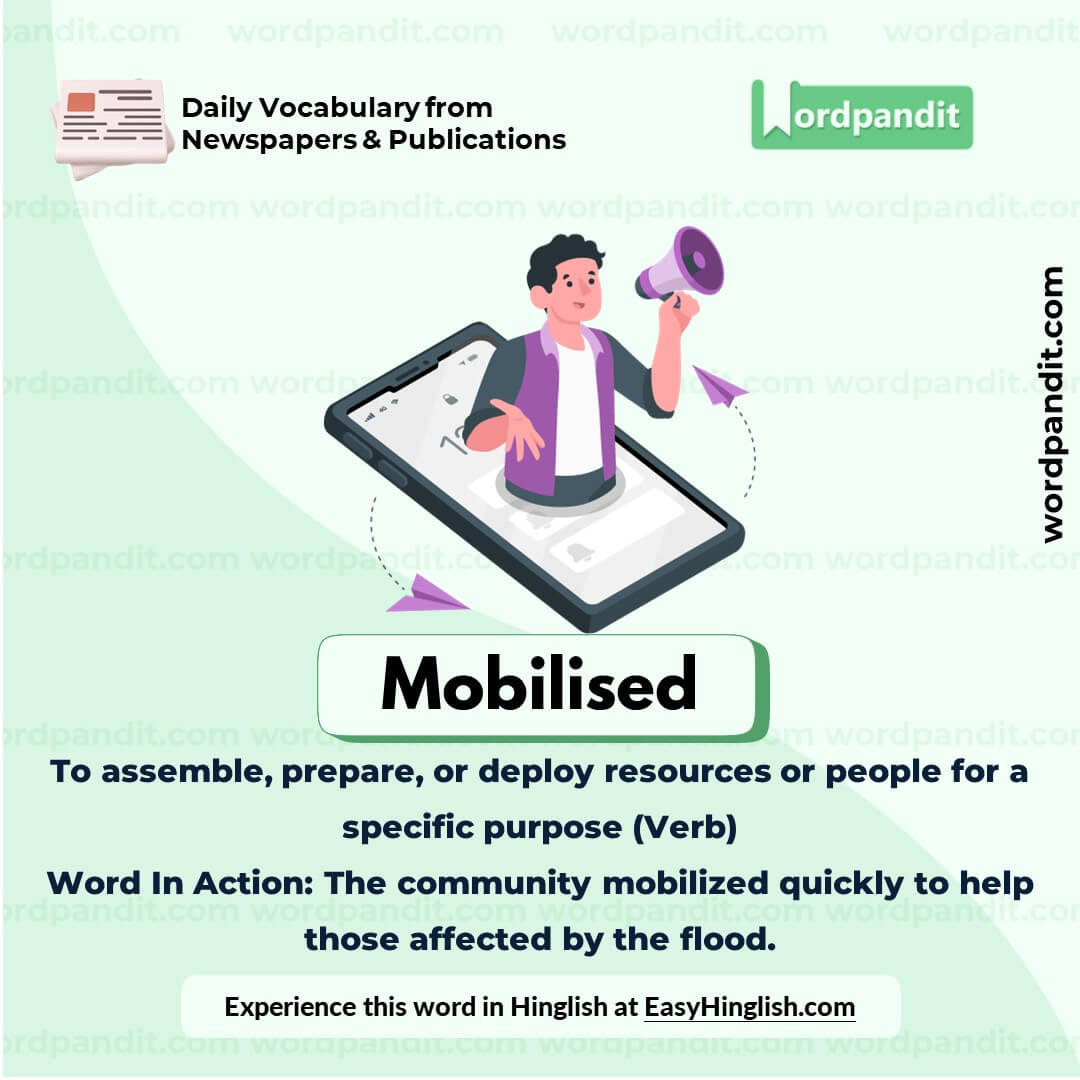Daily Vocabulary from Indian Newspapers and Publications
Welcome to Wordpandit’s Indian Vocabulary Hub
At Wordpandit, we understand the importance of staying rooted in the local context while expanding your language skills. This section focuses on enriching your vocabulary with words and phrases drawn from India’s leading newspapers and publications, ensuring you're learning vocabulary that is practical, relevant, and uniquely Indian.
Why Indian Sources Matter
We believe that the best way to master any language is by immersing yourself in local content. That’s why we carefully curate vocabulary from top Indian publications, including:
- The Hindu
- The Times of India
- The Economic Times
- Hindustan Times
- Live Mint
- The Indian Express
- And many others...
Stay Updated, Stay Relevant
With daily updates from Indian news sources, you’ll be consistently learning words that reflect the trends and shifts in Indian society and culture. Our focus is to provide vocabulary that enhances your understanding of the language in an Indian context.
How Wordpandit Supports Your Goals
Whether you’re preparing for exams, aiming to improve your professional communication, or simply want to stay connected with the latest Indian vocabulary, Wordpandit is here to guide you every step of the way.
Learn with a Practical Approach
Our interactive learning methodology includes real-world examples, engaging activities, and context-specific usage to ensure that every word becomes part of your active vocabulary.
Dive into Indian Vocabulary Today!
Why Choose Wordpandit?
Practical Learning: Focus on words you'll actually encounter in real-world reading, enhancing your comprehension and communication skills.
Diverse Content: From current affairs to scientific breakthroughs, our varied sources expose you to vocabulary across multiple domains.
Effortless Integration: Make Wordpandit a part of your daily routine. Just a few minutes each day can significantly boost your lexicon over time.
Your Path to Vocabulary Mastery
- Visit our Daily Vocabulary section regularly
- Explore new words and their usage in context
- Practice incorporating these words into your own writing and speech
- Track your progress as your vocabulary expands
Start Your Journey Today
Embark on your vocabulary enhancement journey with Wordpandit. By consistently engaging with our daily posts, you'll build a robust vocabulary that serves you well in academic, professional, and personal contexts.
Remember, a word a day keeps linguistic limitations at bay. Make Wordpandit your daily companion in the quest for vocabulary excellence!
WORD-1: Stubble
Context:
"As per the agriculture department sources, besides the rise in the incidents of stubble burning, the incidents of agricultural waste burning have also come to light. The agricultural department authorities claim to be vigilant about the situation on the ground and imposing penalties." - New Indian Express
Explanatory Paragraph:
Stubble refers to the short stalks of crops that remain in the ground after harvesting. It is a common sight in agricultural fields and is often associated with practices like stubble burning, which can have environmental impacts. Understanding this term is key to discussions on sustainable farming and pollution control.
Meaning: The short stalks of grain or plants left sticking out of the ground after harvesting. (Noun)
Pronunciation: STUH-buhl
Difficulty Level: ⭐⭐ Basic
Etymology: From Middle English "stobil," derived from Old French "estuble," and ultimately from Latin "stipula," meaning straw.
Synonyms & Antonyms:
Synonyms: Crop residue, stalk, remains
Antonyms: Harvested field, cleared ground
Usage Examples:
- The farmer decided to plow the stubble back into the soil to improve fertility.
- Stubble burning is a major contributor to air pollution during the harvest season.
- The field was covered with stubble, a sign of a recently completed harvest.
- The sharp stubble made it difficult to walk through the field barefoot.
Cultural Reference:
"Stubble burning in India is a major cause of the seasonal smog that affects northern regions, raising awareness about environmental issues and sustainable farming methods." - New Indian Express
Think About It:
How can modern technology help minimize the harmful effects of stubble burning on the environment?
Quick Activity:
Look around your local community for examples of agricultural practices and write a short note on how farmers manage stubble or crop residue.
Memory Tip:
Think of "stubble" as the "stub" of plants left behind after harvesting, similar to how a pencil stub is what remains after use.
Real-World Application:
Understanding stubble is crucial for addressing agricultural challenges like residue management and reducing the environmental impact of farming practices such as stubble burning.
WORD-2: Vigilant
Context:
"As per the agriculture department sources, besides the rise in the incidents of stubble burning, the incidents of agricultural waste burning have also come to light. The agricultural department authorities claim to be vigilant about the situation on the ground and imposing penalties." - The New Indian Express
Explanatory Paragraph:
Vigilant describes a state of being watchful and alert to potential danger or trouble. It implies a proactive attitude to monitor situations closely and take prompt action when necessary. The word is commonly used to refer to efforts in law enforcement, safety measures, or environmental monitoring.
Meaning: Keeping careful watch for possible danger or difficulties. (Adjective)
Pronunciation: VIJ-uh-luhnt
Difficulty Level: ⭐⭐ Basic
Etymology: Derived from Latin "vigilant-", from "vigilare," meaning to keep awake or be watchful.
Synonyms & Antonyms:
Synonyms: Watchful, alert, attentive, observant
Antonyms: Negligent, inattentive, careless
Usage Examples:
- The security guards remained vigilant throughout the night to ensure no unauthorized entry.
- Parents should be vigilant about the content their children access online.
- The villagers stayed vigilant after reports of wild animals near the settlement.
- Environmental activists called for more vigilant monitoring of industrial emissions.
Cultural Reference:
"In George Orwell's novel '1984,' the government keeps a vigilant eye on its citizens, showcasing the extremes of surveillance and control in a dystopian society." - Literary Reference
Think About It:
In what areas of daily life should people be more vigilant, and what could be the consequences of failing to stay alert?
Quick Activity:
Observe a nearby situation (e.g., traffic, a park, or a workplace) for five minutes and write down examples of people being vigilant or not vigilant.
Memory Tip:
Think of "vigilant" as staying "vigil" or awake, always ready to act if something happens.
Real-World Application:
Being vigilant is essential in professions such as law enforcement, healthcare, and education, where constant attention to detail can prevent accidents or ensure safety and success.
WORD-3: Prosthetic
Context:
"The idea of sport as ‘fair play’ has been complicated by worries over performance-enhancing pharmacological and prosthetic devices adopted by athletes. The outrage has been principally moral: these advanced humans — posthumans — it is alleged, have moved beyond their ‘natural’ bodies and, as a consequence, cheated at sport." - The Telegraph
Explanatory Paragraph:
Prosthetic refers to artificial devices that replace or augment a missing or impaired body part. Originally designed for medical purposes to help individuals regain function or mobility, prosthetics have now extended into other domains, including sports, where advanced devices can enhance human performance. The term often sparks debates about ethics and fairness when such devices are used to gain an edge.
Meaning: A device designed to replace or augment a missing or impaired part of the body. (Adjective or Noun)
Pronunciation: prahs-THEH-tik
Difficulty Level: ⭐⭐⭐ Intermediate
Etymology: From Greek "prosthesis," meaning addition or attachment, through Latin and later Middle English adaptations.
Synonyms & Antonyms:
Synonyms: Artificial limb, assistive device, augmentation
Antonyms: Natural limb, unmodified body, biological part
Usage Examples:
- The athlete's use of a prosthetic leg sparked debates about fairness in the competition.
- Prosthetic devices have transformed the lives of countless individuals, restoring mobility and independence.
- Advanced prosthetic technology is pushing the boundaries of what artificial limbs can achieve.
- Doctors recommended a prosthetic arm to help the patient regain functionality after the accident.
Cultural Reference:
"The use of prosthetic limbs by Paralympic athletes often leads to discussions about innovation and equality in sports. These devices symbolize resilience and human ingenuity while raising ethical questions about competition fairness." - Sports Ethics Journal
Think About It:
Should advanced prosthetic devices be regulated in professional sports, and if so, how can fairness be balanced with innovation?
Quick Activity:
Research the advancements in prosthetic technology over the last decade and write a paragraph on how they have impacted the lives of differently-abled individuals.
Memory Tip:
Remember "prosthetic" as "pro" (for) + "sthetic" (aesthetic or function), indicating something designed to replace or improve the original part.
Real-World Application:
Prosthetic devices are crucial in medical rehabilitation, allowing individuals to regain lost abilities and live more independent lives. In sports, they challenge our understanding of human limits and fairness.
WORD-4: Mobilised
Context:
"Developing countries, including India, had called for a total of $1.3 trillion to be mobilised annually by developed countries towards developing countries in the form of grants (and grants equivalent) starting from next year." - The Wire
Explanatory Paragraph:
Mobilised refers to the act of organizing and bringing resources, people, or efforts together for a specific purpose. It is commonly used in contexts such as funding, military actions, or social movements, where collective effort is required to achieve a significant goal. In the context of the sentence, it emphasizes the gathering of financial resources to support developmental objectives.
Meaning: To assemble, prepare, or deploy resources or people for a specific purpose. (Verb)
Pronunciation: MOH-buh-lized
Difficulty Level: ⭐⭐ Basic
Etymology: From French "mobiliser," rooted in Latin "mobilis," meaning movable or flexible, combined with the suffix "-ize."
Synonyms & Antonyms:
Synonyms: Gathered, deployed, organized, marshaled
Antonyms: Disbanded, scattered, halted, demobilized
Usage Examples:
- The government mobilised emergency funds to aid the flood-affected regions.
- Community leaders mobilised volunteers to participate in the cleanup drive.
- The army was mobilised quickly in response to the border conflict.
- International organizations mobilised resources to address the pandemic's economic impact.
Cultural Reference:
"The term 'mobilised' gained prominence during global efforts to combat climate change, where nations committed to mobilising billions of dollars in funding for sustainable development." - UN Climate Reports
Think About It:
What are some innovative ways to mobilise resources and people for social or environmental causes?
Quick Activity:
Identify a current issue in your community and create a brief plan to mobilise resources or people to address it.
Memory Tip:
Think of "mobilised" as making something "mobile" or ready to move and act towards a goal, much like mobilizing a vehicle or team.
Real-World Application:
Mobilisation is vital in crisis management, international aid, and social activism, where collective action and resource gathering are key to solving complex problems.
WORD-5: Legitimise
Context:
"Experts say the text legitimises developed nations’ loans to developing countries as climate finance, which leads to the further indebtedness of poorer nations, who have had to borrow large amounts for their development needs, and is against the spirit of the Paris Agreement." - The Wire
Explanatory Paragraph:
Legitimise means to make something acceptable, lawful, or justified in the eyes of a system or society. It often refers to actions, practices, or policies being officially approved or gaining moral or legal acceptance. In the context provided, the term highlights the act of framing developed nations’ loans as climate finance, which raises concerns about fairness and equity.
Meaning: To make something lawful, justified, or acceptable. (Verb)
Pronunciation: luh-JIT-uh-mize
Difficulty Level: ⭐⭐ Basic
Etymology: Derived from Latin "legitimus," meaning lawful, through Old French and later English, with the suffix "-ise" indicating action.
Synonyms & Antonyms:
Synonyms: Authorize, justify, validate, endorse
Antonyms: Denounce, invalidate, discredit, reject
Usage Examples:
- The government passed a law to legitimise the use of renewable energy subsidies.
- Critics argue that the policy attempts to legitimise corporate control over public resources.
- The new regulations legitimised the trade practices that were previously considered unethical.
- Some activists feel that endorsing such agreements legitimises inequality between nations.
Cultural Reference:
"The concept of legitimising power has been a central theme in political theory, from Machiavelli’s writings on ruling effectively to modern debates on governance and justice." - Political Thought Archives
Think About It:
Should actions or policies that disproportionately harm disadvantaged groups ever be legitimised, even for a greater good?
Quick Activity:
Think of a practice or policy in your country that has been legitimised but remains controversial. Write a short paragraph explaining your views on it.
Memory Tip:
Remember "legitimise" by breaking it down: "legit" means lawful or real, and "-ise" means to make something into that state.
Real-World Application:
The concept of legitimisation is vital in fields like law, governance, and international relations, where acceptance or rejection of actions can shape public perception and policies.
















